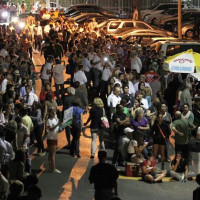Supreme Court Voting Rights Decision Simplified—A Republican Dream Come True
 Waiting to vote in Florida (photo: Pedro Portal, AP, El Nuevo Herald)
Waiting to vote in Florida (photo: Pedro Portal, AP, El Nuevo Herald)
The Voting Rights Act of 1965 stipulated that the U.S. government can oversee election law in states, cities and counties where racial discrimination had occurred, based on laws that these jurisdictions had passed and/or on the basis of unnaturally low voter registration or turnout.
On Tuesday, the Supreme Court, in the case of Shelby County, Alabama v. Holder, voted 5-4 that the federal government does have the right to oversee state and local voting procedures, but that the data used, which were last updated in 1975, are outdated and need to be revised by Congress.
If you lived in the clouds, far away from the impurities of daily life, it would appear that this decision is reasonable. After all, the Supreme Court justices did not invalidate the concept of federal oversight of elections to prevent racial discrimination, and 38 years is a pretty long time to be using the same data. If Congress revised the criteria used to justify oversight of individual states and other localities, it might release from oversight places that have made real progress, while adding new ones that did not have problems several decades ago.
If, however, you lived somewhere other than in the clouds—for example in the United States—the practical implications of the ruling look much different. That’s because, until Congress does redo the criteria, the Republican Party has its dream situation, one in which states can enact whatever voting procedures they want to limit minority voting without serious threat of reprisal from the federal government. This means that Republicans have absolutely no motivation to cooperate in rewriting the criteria for oversight.
It is an inescapable fact that minority groups (African-Americans, Hispanic-Americans, Asian-Americans, Native Americans) overwhelmingly mistrust Republicans and vote in great numbers for the only other major political party, the Democrats. So it behooves Republican strategists to reduce the number of minority voters.
The Supreme Court decision relating to Section 5 of the Voting Rights Act frees Republican legislators and officials to do just that. Here are a couple examples of what Republicans can now do without having to worry about being restricted by the Voting Rights Act.
They could decrease the number of polling places in minority neighborhoods, forcing black voters to wait in line for hours, while voters in white neighborhoods breeze through in a matter of minutes. Or they could require citizens without driver’s licenses to obtain a photo ID…but only in one office in the state capitol, which might be open only a few hours a week. Or they could reduce minority representation by replacing district voting with at-large voting
Probably, at this very moment, Republican strategists are dreaming up even more creative methods of hampering minority voting.
Of course all of these anti-minority restrictions will be met with lawsuits filed by civil rights and civil liberties groups and by the Department of Justice. But as long as Congress does not enact new legislation to define the criteria that justify federal oversight, and Section 5 remains in limbo, these lawsuits will take years to plod through the legal system.
-David Wallechinsky
To Learn More:
If Section 5 Falls: New Voting Implications (by Myrna Pérez and Vishal Agraharkar, Brennan Center for Justice Analysis)
- Top Stories
- Unusual News
- Where is the Money Going?
- Controversies
- U.S. and the World
- Appointments and Resignations
- Latest News
- Trump Orders ICE and Border Patrol to Kill More Protestors
- Trump Renames National Football League National Trump League
- Trump to Stop Deportations If…
- Trump Denounces World Series
- What If China Invaded the United States?






Comments